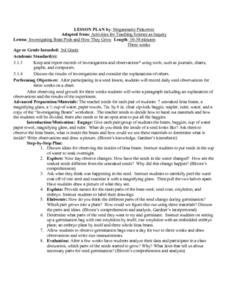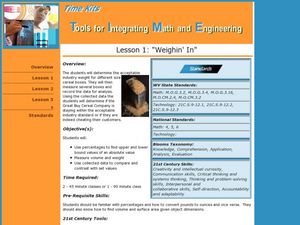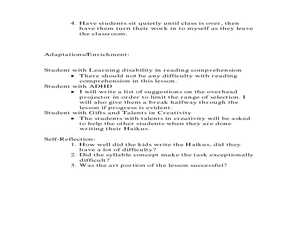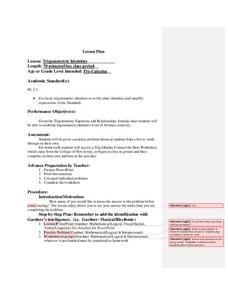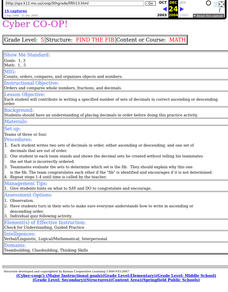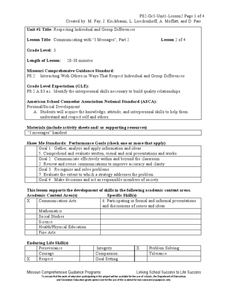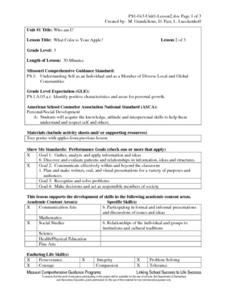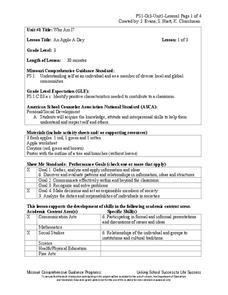Curated OER
Investigating Bean Pods and How They Grow
Third graders observe and create a record of seed growth over time. After planting a seed, 3rd graders record their observations of the seed's growth over a three week period. Upon conclusion of the experiment, they write a paragraph...
Curated OER
Tools for Integrating Math and Engineering: Weighin' In
Students collect and analyze data on a fictional cereal company's products. In this measurement instructional activity, students collect data from cereal boxes (weight, volume, surface area, etc.) to determine if the boxes labels...
Nemours KidsHealth
Smoking: Grades 3-5
Learners discuss the pros and cons of smoking. In this smoking lesson, students navigate websites to find information on smoking and then participate in a discussion with specific discussion questions.
Curated OER
Earth's Rotation
Fourth graders investigate the Earth's rotation. In this Earth's rotation lesson, 4th graders realize that the rotation of Earth causes the days and nights on Earth. Students break into groups and use a flashlight and a sphere to...
Curated OER
Haiku Poems
Eighth graders study haiku poems. In this poetry lesson plan, 8th graders write two haikus containing the standard 5-7-5 syllables content about things they enjoy within nature.
Curated OER
Trigonometric Identities
Learners calculate the six trigonometric identities. In this algebra instructional activity, students verify other identities using the basic trigonometric identities of sine, cosine and tangent. They complete a worksheet with hints and...
Curated OER
The Changing Me
Third graders study the human body. In this health lesson, 3rd graders discuss that everyone's body is growing, measure body parts using a tape measure, and color the body worksheet.
Curated OER
Function of a Stem
Fourth graders perform an experiment to test the function of a stem. In this science activity, 4th graders write a description of their investigations. Students also explain how the stem interacts with the rest of the plant. Students use...
Curated OER
Solving Linear Equations
Ninth graders solve linear equations. In this algebra lesson, 9th graders discuss the steps for solving linear equations and work through examples with the teacher. They work in pairs to create their own linear equation and complete a...
Curated OER
King of the Playground by Phyllis Reynolds Naylor
Students discover ways to resolve conflicts. In this bullying lesson, students read a book about a boy who is having problems on the playground. Students discuss how the characters feel and what they do to stand up for themselves....
Curated OER
A Trip Down Memory Lane- Memoir Lesson Plans
By teaching memoir lesson plans, teachers can help students expand their awareness of different languages and cultures.
Curated OER
Find The Fib - Decimals
Fifth graders count, order, compares, and organize objects and numbers. Each student will contribute in writing a specified number of sets of decimals in correct ascending or descending order.
Curated OER
Find Someone Who........
Fifth graders identify, describe, and classify lines, line segments, rays, and angles. When given a diagram of a line, they classify the line as perpendicular, parallel, intersecting, vertical, horizontal, and/or diagonal.
Curated OER
Communicating with "I Messages", Part 2
Third graders listen to ways they share their feelings with others. After brainstorming situations where "I messages" would be appropriate, pairs of students write messages from the lists they developed. They discuss how their messages...
Curated OER
RESPECT -- A Basic Skill
Seventh graders are shown a variety of advertisements and commercials and note the product being sold. As a class, they compare and contrast their answer to the actual product. To end the lesson, they discuss whether or not they would...
Curated OER
Assessing Self-Concept
Eleventh graders complete a self-assessment worksheet. They discuss the worksheet and write their responses. Students create a personalized list of things they can improve or maintain their positive self-concept. Students create a list...
Curated OER
PASS-N-PRAISE
Fifth graders take turns explaining, orally and in writing, how to solve multiplication problems that contain no more than three digit by two-digit numbers.
Curated OER
Line Ups
Fifth graders describe the lunar cycle. develop an understanding of the order and phases of the moon. Each student in a team contributes orally in order to make a line up of the moon phases in order.
Curated OER
The Many Roles I Play in My Community
Second graders are asked: "What roles do people have in the community?" They view a large web on chart paper. Students discuss the roles that they play in their community. They are told that just as the principal or teacher has many...
Curated OER
What Color Is Your Apple?
Third graders spend time identifying the characteristics they have and ones they would like to develop for their own personal growth. As a class, they brainstorm ways they can tell they are growing up or being mature. Individually, they...
Curated OER
An Apple A Day
Third graders brainstorm a list of how they can tell if someone feels bad about themselves. As a class, they describe three different apples shown to them. Individually, they cut out shapes of apples and color them to place them on a...
Curated OER
Be a Problem Solving Star
Third graders observe a math problem and discuss what it is and what they should do with it. They are introduced to the STAR steps for problem solving and discuss how to use it to answer math problems as well as incorporating some of the...
Curated OER
What Does Respect Look Like in School?
Fourth graders discuss why everyone needs and wants to feel respected. As a class, they share what respect looks like and what disrespect looks like. They pretend they have to leave their most valued object with a secret agent and what...
Curated OER
Respecting Differences
Fifth graders brainstorm what a relationship looks like in which both people respect each other. After completing a worksheet, they discuss the importance of respecting other beliefs. To end the instructional activity, they identify...


